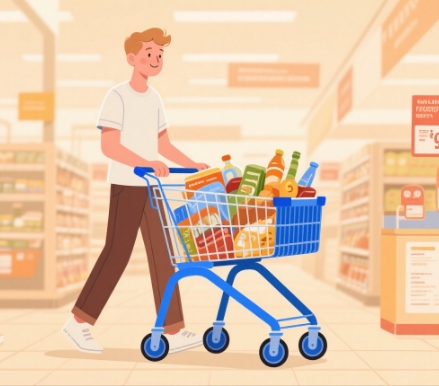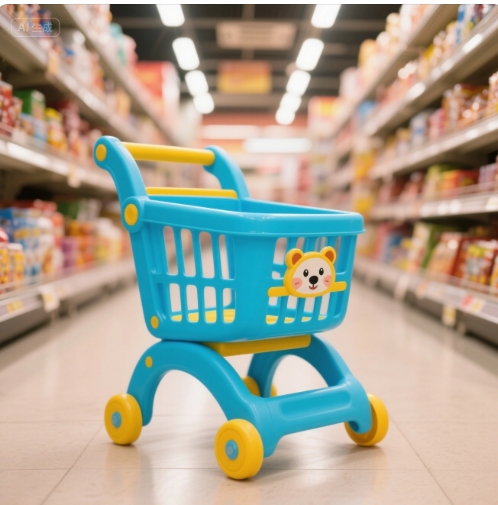Heavy-Duty vs. Standard Shopping Trolleys: Core Differences & Procurement Value for UK Outdoor Businesses
The rapid growth in outdoor activities, family recreation, park management, community events, and outdoor rental markets in the UK has led to diversified material transport needs for related businesses. Shopping trolleys, as crucial logistics support equipment, directly impact a business's operational efficiency and customer experience. As a dedicated manufacturer of shopping trolleys, we understand the nuanced differences in product performance that directly impact your operational efficiency and customer experience. This article focuses on the core distinctions between heavy-duty shopping trolleys and standard shopping trolleys in outdoor applications, aiming to help UK businesses optimise their procurement decisions and enhance operational efficiency and service quality.
I. Fundamental Differences in Product Design & Applicable Scenarios
Standard shopping trolleys typically feature a lightweight design, primarily intended for short-distance, light-duty transport on flat surfaces like those found in retail stores and supermarkets. Their materials are often lightweight plastic or aluminium alloy, with a simple structure for flexible operation. However, their adaptability to harsh outdoor environments is limited; they are susceptible to weather and complex terrains, making them unsuitable for varied outdoor settings such as park lawns, beaches, and gravel paths common across the UK.
In contrast, heavy-duty shopping trolleys are designed with a core focus on robust structure and weather resistance. As your manufacturing partner, we ensure they utilise high-strength steel or reinforced aluminium alloy and are equipped with large, multi-functional wheels specifically adapted for beaches, park lawns, gravel paths, and other complex terrains. Their powerful load capacity and stable performance make them widely applicable in diverse business scenarios such as outdoor event organisation, family amusement parks, community delivery, outdoor equipment rental, and park management across the UK, ensuring the safe and efficient transport of materials.
II. Differentiated Advantages in Load Capacity & Mobility Performance
Standard shopping trolleys typically have a load capacity between 30 to 50 kilograms, suitable for light item transportation over short distances. These trolleys usually come with smaller, hard wheels, lacking effective shock absorption and anti-slip features, which results in poor performance in complex or varied outdoor environments. On uneven surfaces like sand, gravel, or grass, the trolley's stability and operational convenience are significantly compromised. This not only affects transportation efficiency but also increases the operator's physical strain, leading to fatigue and potential safety hazards. Due to their limited environmental adaptability, standard shopping trolleys have significant limitations in the UK outdoor market, failing to meet diverse logistics needs and consequently hindering business expansion and overall operational efficiency.
In contrast, heavy-duty shopping trolleys offer significantly enhanced load capacity, often easily carrying over 100 kilograms. This vastly expands the scope and application scenarios for outdoor material transport. These trolleys are typically equipped with pneumatic or multi-functional rubber wheels, providing excellent shock absorption and anti-slip performance. They can effortlessly navigate various complex outdoor terrains, including beaches, park lawns, gravel paths, and uneven mountainous areas found throughout the UK. Whether it's transporting supplies for park events, dispatching outdoor rental equipment, or frequently moving items for community activities, heavy-duty shopping trolleys ensure smooth and stable transport, preventing material damage and user fatigue caused by bumps or slips.
III. Durability & Maintenance Cost Analysis
Standard shopping trolleys have a relatively simple structure and are suitable for light-duty use. Outdoor environments can lead to rust and structural deformation, requiring frequent maintenance and replacement. The accumulated long-term maintenance costs and equipment downtime risks negatively impact business operations and reduce overall profit margins.
Heavy-duty shopping trolleys, which we build, utilise corrosion-resistant coatings and reinforced designs, adapting to varied climates and harsh environments. Their lifespan is significantly extended, and maintenance requirements are lower, reducing operational risks and extra costs for businesses. This also enhances the return on equipment assets and long-term investment value.
IV. More Differences: Portability, Safety, and Customisation
Portability & Storage Flexibility
Standard shopping trolleys often have a fixed structure and are bulky, making them inconvenient to fold and store, which limits on-site operational flexibility. Heavy-duty shopping trolleys often feature foldable or detachable designs, facilitating transport and on-site storage. This adaptability meets the dynamic needs of outdoor events and equipment rental businesses.
Safety Performance
Heavy-duty shopping trolleys typically come equipped with braking systems and stable locking mechanisms, ensuring transportation safety and reducing the likelihood of accidents. Standard shopping trolleys are comparatively lacking in safety features.
Customisation & Expandability
As a dedicated shopping trolley bag manufacturer, we offer extensive customisation for heavy-duty shopping trolleys. They support tailored modular accessories, such as storage baskets, protective covers, and sunshades, to meet the demands of various business scenarios. Standard shopping trolleys offer limited customisation options, making it difficult to meet complex outdoor operational needs.
V. Enterprise Procurement Decision Recommendations
Business Needs-Driven
For businesses involved in park management, outdoor event organisation, community delivery, and rental services across the UK, we recommend prioritising heavy-duty shopping trolleys with strong load capacity and environmental adaptability. This will ensure operational efficiency and service quality.
Comprehensive Cost-Benefit Assessment
When procuring, comprehensively consider the initial equipment investment and subsequent maintenance costs. Avoid the risk of frequent repairs and replacements that come with purchasing low-priced but low-quality products. This ensures maximised long-term operational economic benefits.
Equipment Portability & Storage Needs
For business scenarios requiring frequent deployment and on-site storage, choose foldable heavy-duty shopping trolleys. This will enhance logistics flexibility and reduce storage space requirements.
Brand Reputation & After-Sales Guarantee
Choosing a supplier with a good reputation and comprehensive after-sales service is crucial. This ensures the long-term stable operation and technical support for your equipment, minimising operational risks. Our factory, founded in 2015, boasts nearly a decade of expertise in the bag and trolley manufacturing industry, offering direct supply and reliable partnership to UK businesses.
VI. Conclusion
enterprises targeting outdoor parks, family entertainment, community activities, and rental markets in the UK, heavy-duty shopping trolleys are a critical tool for boosting operational efficiency and customer satisfaction, thanks to their superior load capacity, adaptability, and durability. Compared to standard shopping trolleys, heavy-duty models are better equipped to handle the challenges of complex outdoor environments and diverse business needs, helping businesses achieve efficient material management and service delivery. When procuring, enterprises should scientifically select trolley products based on their actual business needs and operational environment to achieve the best return on investment and sustained competitive advantage.





